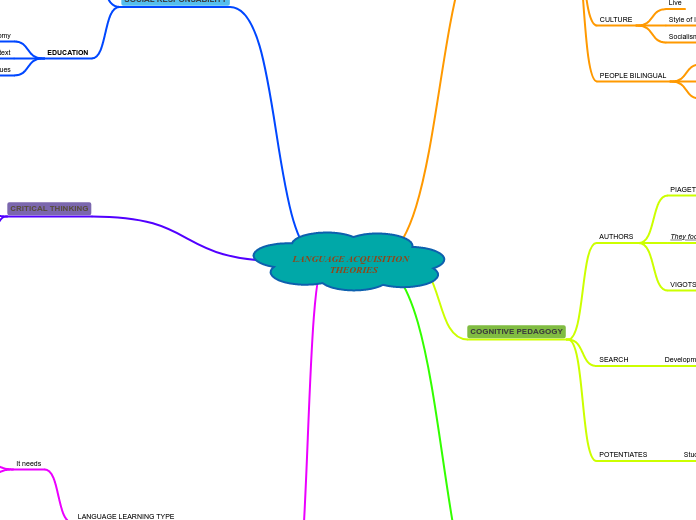LANGUAGE ACQUISITION THEORIES
SOCIAL RESPONSABILITY
Welfare of the society and environment
Benefits
Interests
Traditions
Participation
Service Learning
Skills
EDUCATION
Autonomy
Social cultural context
Appropiate values
CRITICAL THINKING
is an Intellectal process
Reasoning
Divisions
are
Clarity
Accuracy
Consistency
Experience
Through
Communiction
Reflection
Develop
Intellectual virtues
Intellectual integrity
Intellectual sense
Empathy
Subtopic
PROBLEM SOLVING
LANGUAGE LEARNING TYPE
It needs
Previous concepts
Priciples
It involves
Signal learning
Stimulus-response
Chaining
Multiple discriminations
Concept learning
Principle learning
Stemberg
Common sense
practice and creativity
succes in life
In the brain
left brain dominance
logical problem solving
left brain dominance
intuitive problem solving
the hemispheres work togueter
Personality
Self knowlwdge
value system
beliefs
ideas
attitudes
BILINGUALISM
SECOND LANGUAGE
Opportunities
Study
Knowledge
SKILLS
Speaking
Listening
Writting
Reading
COMMUNICATION
Facilities
Experience
Native Language
BENEFITS
Oportunity to obtain a job
To know other countries
Development the culture
Differents types of job
Easier to learn a third language
CULTURE
Live
Style of live
Socialism
PEOPLE BILINGUAL
English
Spanish
Other languages
COGNITIVE PEDAGOGY
AUTHORS
PIAGET
They focused
Language
Important tool
Basic concepts
Adaptation
Asimilation
Accommodation
VIGOTSKY
SEARCH
Development of mental processes
From
Strategies based on metacompression
Educational desicion
Formal
Learning information
Teaching- Learning
Not formal
Build
Order
Interpret
Transform
POTENTIATES
Students skill
Development of their autonomy
Process information solve problems
Education
In the world
behaviorism
imitation
practice
habit formation
rainforcement
repetition pattens
memorization
verbal operants
audio-lingual method
Mimicry
